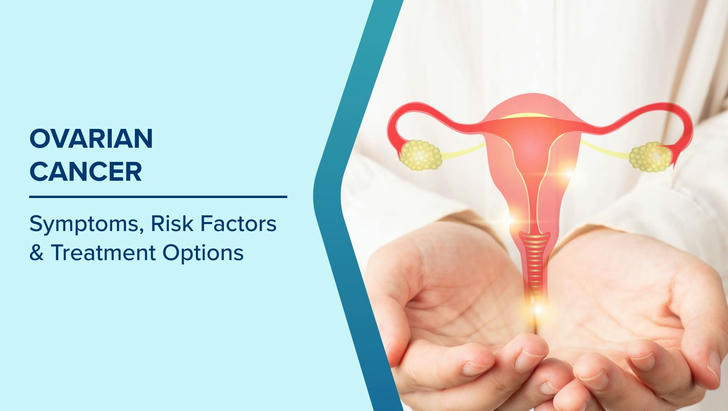How Long Can You Live with Ovarian Cancer? Real Survival Rates by Stage (2025 Guide)
How long can you live with ovarian cancer?
Ovarian cancer, often called the "silent killer," is one of the most aggressive cancers. However, thanks to advances in early detection and treatment, survival rates are improving. Let’s dive into the real survival rates by stage and how they affect life expectancy.

Understanding Ovarian Cancer Stages and Survival Rates
Ovarian cancer is classified into four stages (I–IV) based on tumor size, spread to surrounding tissues, and metastasis to other organs. Survival rates vary by stage and treatment response.
| Stage | Description | 5-Year Survival Rate (U.S.) | Outlook |
|---|---|---|---|
| Stage 1 | Cancer confined to one or both ovaries | ≈93% | Excellent — often curable with surgery and chemotherapy |
| Stage 2 | Spread to pelvic region but not beyond | ≈70% | Good with surgery and chemotherapy |
| Stage 3 | Spread to abdominal cavity or lymph nodes | ≈39% | Aggressive treatment improves outcomes |
| Stage 4 | Metastatic (spread to distant organs) | ≈17% | Chronic but treatable with ongoing therapies |
Source: American Cancer Society (SEER 2024)
Stage 1 Ovarian Cancer: Excellent Prognosis
Stage 1 ovarian cancer means the cancer is confined to the ovaries. When detected early, the chances of survival are very high.
Treatment options:
Surgical removal of the ovaries (often a complete hysterectomy)
Chemotherapy, sometimes with targeted therapy
Life expectancy:
- With proper treatment, nearly 93% of women survive 5+ years after diagnosis, and many live normal lifespans.
Why early detection matters:
Early detection through pelvic exams, ultrasounds, and CA-125 tests can lead to high survival rates.
Stage 2: Spread to Pelvic Region but Treatable
Stage 2 ovarian cancer indicates that the cancer has spread from the ovaries to nearby pelvic structures.
Treatment options:
Surgery to remove the affected organs and lymph nodes
Chemotherapy or targeted therapy
5-year survival rate:
- About 70% survive five years or more, depending on treatment and individual factors.
Prognosis:
- Timely treatment significantly improves survival rates and can prevent further spread.
Stage 3: Advanced but Manageable
Stage 3 ovarian cancer has spread to the abdominal cavity or lymph nodes. At this stage, the cancer is more advanced, but still treatable.
Treatment options:
Surgery to remove as much of the cancer as possible
Chemotherapy, including the use of platinum-based drugs (e.g., carboplatin, cisplatin)
Survival rate:
- Approximately 39% survive five years, but ongoing treatments can improve survival and quality of life.
Encouraging note:
Many women with Stage 3 ovarian cancer live 10 years or more with continuous treatment and regular monitoring.
Stage 4 (Metastatic) Ovarian Cancer: Chronic Management
Stage 4 ovarian cancer means the cancer has spread to distant organs, such as the lungs, liver, or intestines. While Stage 4 ovarian cancer is not curable, it is treatable as a chronic condition.
Treatment options:
Surgery, if feasible, to remove large tumors
Chemotherapy, hormone therapy, and targeted therapies (e.g., PARP inhibitors)
Median survival:
- The median survival rate for Stage 4 ovarian cancer is around 17%. However, ongoing treatments can help many women live 5–10 years or more.
Recent breakthroughs:
- New treatments, including immunotherapy and targeted therapies, have dramatically improved long-term survival for Stage 4 patients.
Key Factors Affecting Life Expectancy
| Factor | Impact on Prognosis | Example |
|---|---|---|
| Cancer subtype | Some types are more aggressive | High-grade serous carcinoma requires more aggressive therapy |
| Early detection | The earlier the stage, the better the outcome | Detecting Stage 1 cancer provides the best chance for long-term survival |
| Treatment plan | Tailored treatment approaches improve survival | Surgery + chemotherapy combination is often most effective |
| Age and health | Affects treatment options | Healthier women tend to have better outcomes |
2025 Ovarian Cancer Survival Chart
| Stage | 5-Year Survival Rate | 10-Year Survival Rate (Est.) | Prognosis |
|---|---|---|---|
| Stage 1 | 93% | 90% | Often curable with surgery + chemotherapy |
| Stage 2 | 70% | 65% | Good survival with treatment |
| Stage 3 | 39% | 30% | Long-term management with combination therapy |
| Stage 4 | 17% | 10% | Chronic disease management with ongoing therapies |
Living Beyond Diagnosis: Hope and Progress
More women than ever before are surviving ovarian cancer, thanks to advances in early detection and new treatments.
Key takeaways:
Early detection through regular screenings can dramatically increase survival rates.
Even in advanced stages, modern treatments are improving outcomes and quality of life.
Psychological support and maintaining physical health are just as important as treatment.
Conclusion: Ovarian Cancer Survival Is Improving — and So Is Hope
Ovarian cancer survival rates continue to improve, thanks to advances in early detection, personalized treatments, and ongoing research.
“Ovarian cancer is no longer a death sentence. With proper treatment, many women live long, healthy lives after diagnosis.”
